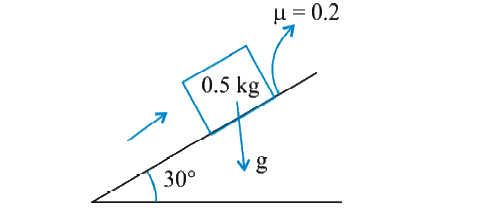A man pushes a 80 N crate a distance of 5.0 m upward along a frictionless slope that makes an angle of 30∘ with the horizontal. The force he exerts is parallel to the slope. If the speed of the crate increases at a rate of 1.5 then the work done by the man is :
−200J
61 J
140 J
260 J
The correct Answer is:D
To solve the problem step by step, we will follow these steps:
Step 1: Identify the given data
- Weight of the crate (W) = 80 N
- Distance moved along the slope (d) = 5.0 m
- Angle of the slope (θ) = 30°
- Acceleration of the crate (a) = 1.5 m/s²
Step 2: Calculate the mass of the crate
The weight (W) is related to mass (m) by the equation:
W=mg
Where g (acceleration due to gravity) is approximately 10m/s2.
Thus, we can find the mass:
m=Wg=80N10m/s2=8kg
Step 3: Calculate the component of weight acting along the slope
The component of the weight acting down the slope is given by:
Wdown=Wsin(θ)
Substituting the values:
Wdown=80N⋅sin(30°)=80N⋅0.5=40N
Step 4: Apply Newton's second law to find the force exerted by the man
Using Newton's second law:
F−Wdown=ma
Where F is the force exerted by the man.
Substituting the known values:
F−40N=8kg⋅1.5m/s2
F−40N=12N
F=12N+40N=52N
Step 5: Calculate the work done by the man
The work done (W) is given by the formula:
W=F⋅d⋅cos(θ)
Since the force exerted by the man is parallel to the slope, θ=0° and cos(0°)=1:
W=F⋅d
Substituting the values:
W=52N⋅5.0m=260J
Final Answer
The work done by the man is 260 Joules.
---
- Weight of the crate (W) = 80 N
- Distance moved along the slope (d) = 5.0 m
- Angle of the slope (θ) = 30°
- Acceleration of the crate (a) = 1.5 m/s²
The weight (W) is related to mass (m) by the equation:
W=mg
Where g (acceleration due to gravity) is approximately 10m/s2.
m=Wg=80N10m/s2=8kg
The component of the weight acting down the slope is given by:
Wdown=Wsin(θ)
Substituting the values:
Wdown=80N⋅sin(30°)=80N⋅0.5=40N
Using Newton's second law:
F−Wdown=ma
Where F is the force exerted by the man.
F−40N=8kg⋅1.5m/s2
F−40N=12N
F=12N+40N=52N
The work done (W) is given by the formula:
W=F⋅d⋅cos(θ)
Since the force exerted by the man is parallel to the slope, θ=0° and cos(0°)=1:
W=F⋅d
Substituting the values:
W=52N⋅5.0m=260J
The work done by the man is 260 Joules.
Topper's Solved these Questions
- BOOK - VMC MODULES ENGLISHCHAPTER - ENERGY & MOMENTUMEXERCISE - Level - 1 PARAGRAPH QUESTIONS3videos
ENERGY & MOMENTUM
- BOOK - VMC MODULES ENGLISHCHAPTER - ENERGY & MOMENTUMEXERCISE - LEVEL - 248videos
ENERGY & MOMENTUM
- BOOK - VMC MODULES ENGLISHCHAPTER - ENERGY & MOMENTUMEXERCISE - LEVEL - 0 - LONG ANSWER TYPE5videos
ENERGY & MOMENTUM
- BOOK - VMC MODULES ENGLISHCHAPTER - ELECTROSTATICSEXERCISE - JEE Advanced (Archive)89videos
ELECTROSTATICS
- BOOK - VMC MODULES ENGLISHCHAPTER - GASEOUS STATE & THERMODYNAMICSEXERCISE - JEE ADVANCED (ARCHIVE )111videos
GASEOUS STATE & THERMODYNAMICS
Similar Questions
A boy wants to hold a 50 kg box on a snow covered hill. The hill makes an angle of 30∘ with the horizontal. What force the boy must exert parallel to the slope ?
View SolutionA person pushes a block of mass 4 kg up a frictionless inclined plane 10 m long and that makes an angle of 30∘ with the horizontal . Then the work done is
View SolutionA man pulls a box on a horizontal floor through a distance of 20 m with a force of 30 N applied along a rope tied to the box and making and angle of 60° with the horizontal. Calculate the work done.
View SolutionA force of 15 N is required to pull up a body of mass 2 kg through a distance 5 m along an inclined plane making an angle of 30∘ with horizontal as shown in fig calculate :
(i)the work done by the force in pulling the body.
(ii)The force due to gravity on the body,
(iii)the work done against by the force due to gravity Take :g=9.8 m s−2.
(iv)Account for the difference in answers of part (i) and part (iii).View SolutionA 30 kg crate is moved along a horizontal floor by a warehouse worker who's pulling on it with a rope that makes a 60∘ angle with the horizontal. The tension in the rope is 200 N and the crate slides a distance of 10 m. how much work is done on the crate by the worker?
View SolutionWhen a man moves down the inclined plane with a constant speed 5ms−1 which makes an angle of 37∘ with the horizontal, he finds that the rain is falling vertically downward. When he moves up the same inclined plane with the same speed, he finds that the rain makes an angle θ=tan−1(78) with the horizontal. The speed of the rain is
View SolutionA block of mass 0.5 kg is kept on a rough inclined plane making an angle of 30∘ with horizontal. What power will be required to move the block up the plane (along the plane) with a velocity of 5m/s ? (Take m = 0.2 between block and plane)
 View Solution
View SolutionA man observes that when he moves up a distance c metres on a slope, the angle of depression of a point on the horizontal plane from the base of the slope is 300, and when he moves up further a distance c metres, the angle of depression of that point is 450. The angle of inclination of the slope with the horizontal is.
View SolutionA person holds a bucket of weight 60N . He walks 7m along the horizontal path and then climbs up a vertical distance of 5m. The work done by the man is
View SolutionA man carries a load on his head through a distance of 5 m. The maximum amount of work is done when he
View Solution
